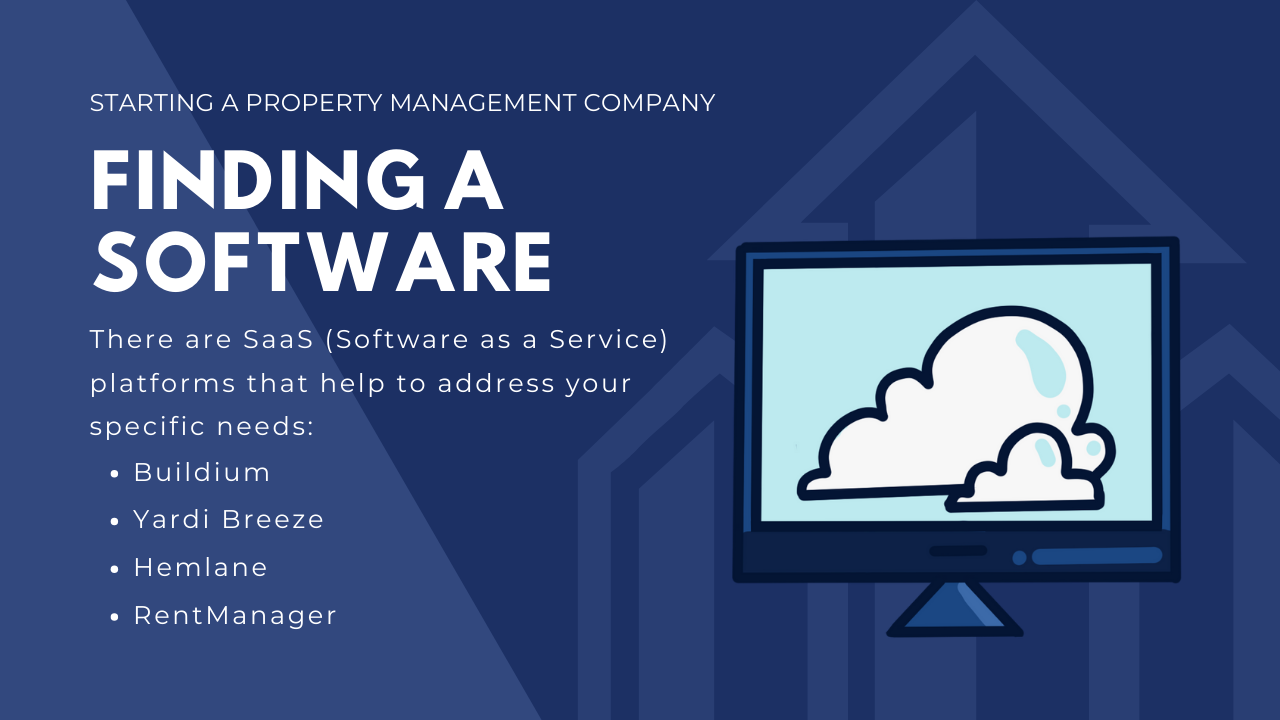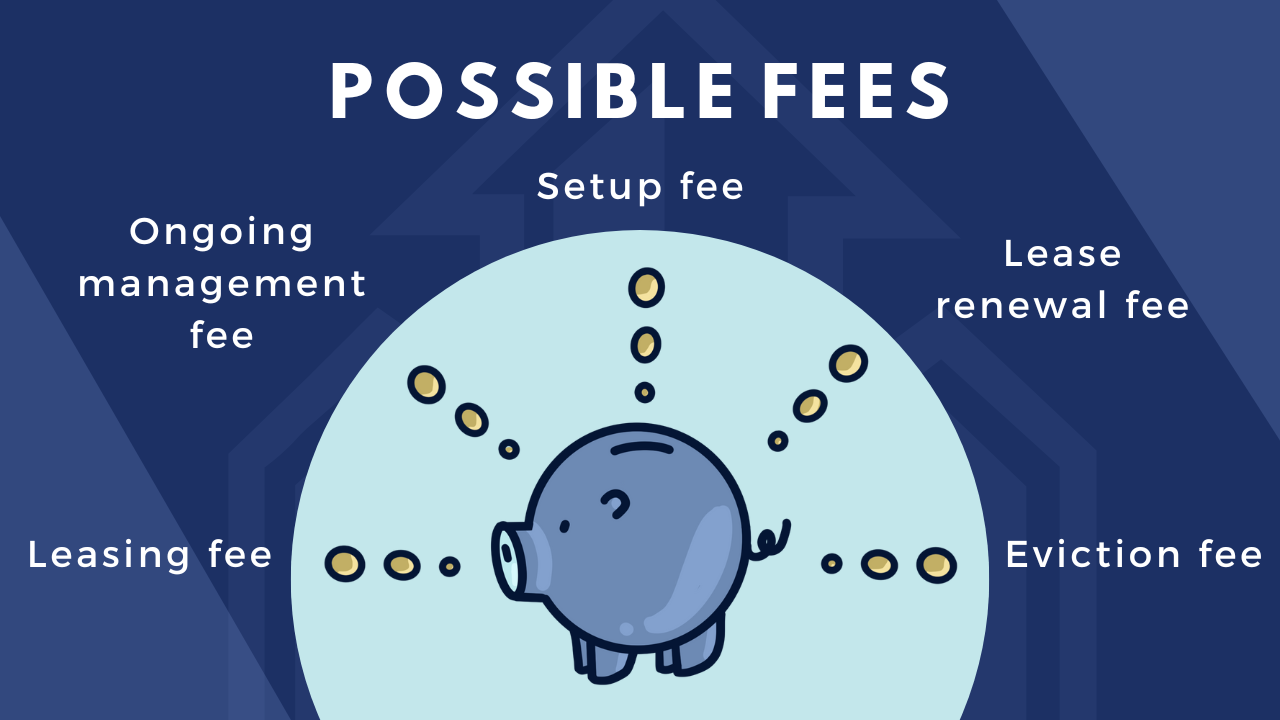FREE Training: How to Launch Your Property Management Company
Are you an aspiring property manager who is looking to start their own property management business in Illinois?
Starting your own business of any kind can be a daunting task, and this is especially true in property management.
Property managers have a lot on their plate on a day to day basis, so it is important to make sure that everything in your new property management business is set up correctly from the very beginning to ensure that your operations remain efficient and organized in the long run.
While being a property manager has many pros, including a flexible schedule, low start up costs, and passive income, there can be many hurdles that come along with the job as well.
In this blog post, we here at Upkeep Media will talk about everything you need to know before starting your property management company in Illinois. From creating a solid business plan and doing thorough market research to finding new clients and scaling your business, you’ll be well on your way to start a property management enterprise.
What Exactly Does an Illinois Property Management Company Do?
Being a property manager requires a long list of skill sets in order to succeed.
One aspect of property management that is simply unavoidable is dealing with lots of different kinds of people. This doesn’t just mean tenants and clients!
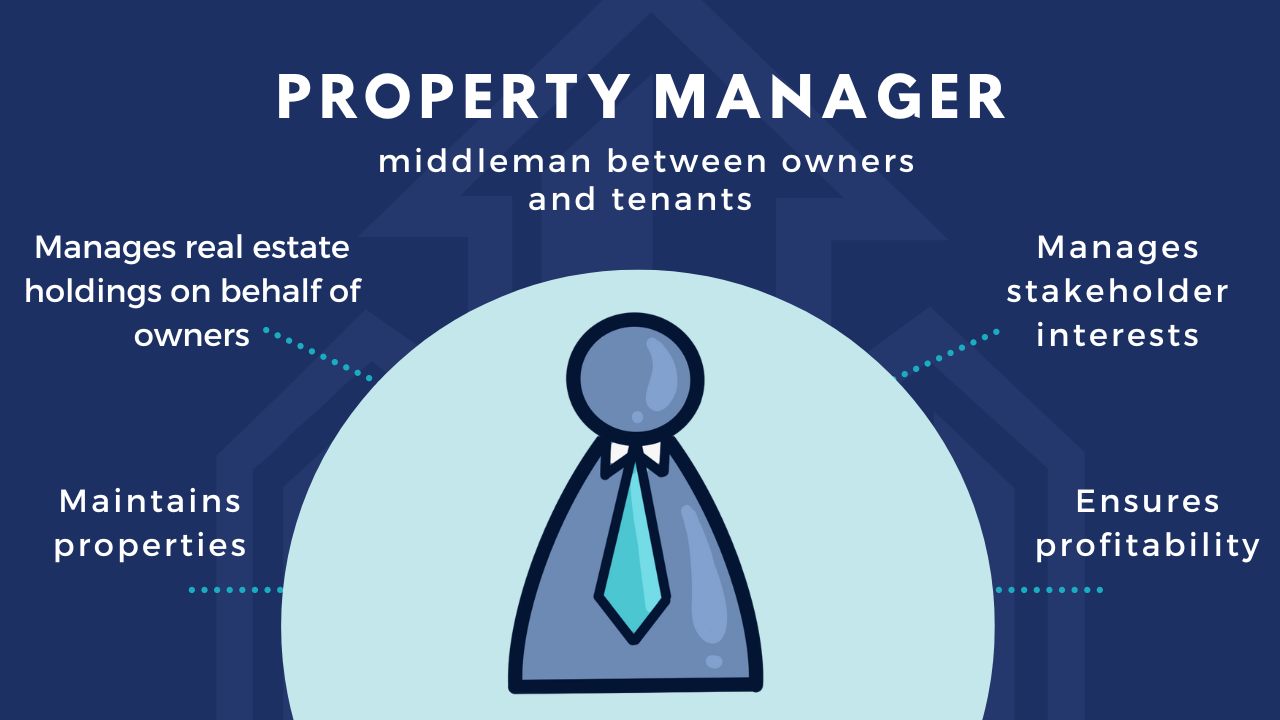
On a regular basis, property managers will have to deal with maintenance contractors, real estate agents, lawyers, and more. This means that if you are looking into property management as a career for yourself, you will need to have excellent interpersonal and communication skills in order to thrive.
In addition to being an excellent communicator, it also helps any property manager to be highly focused and self motivated.
This is true of most business owners, but it is especially relevant when you become a property manager.
Property management requires a lot of hard work and determination, whether it involves gaining new clients, advertising vacant properties, or putting out fires on a daily basis. It is extremely valuable for a property manager to have a strong work ethic and the ability to handle a crisis at any time.
Lastly, it is helpful to have experience in training employees. You will need this skill as your property management company grows.
As you begin to gain more clients and properties to take care of, you will most likely be unable to handle everything yourself, and you will need to hire a team of professionals to help you cover all of your bases.
Being able to properly and patiently train your new employees is a valuable skill that you will need to gain if you want to effectively grow your own property management company.
Step 1: Understand the Different Ways to Structure Your Business
Before you begin diving into property management, there are some essential steps that you must take in order to establish your business legally and professionally.
Firstly, it is absolutely crucial to meet the necessary state requirements to set up a legal entity for your property management company. In Illinois, having a real estate broker’s license or a real estate license is often a requirement for property managers engaging in certain activities.
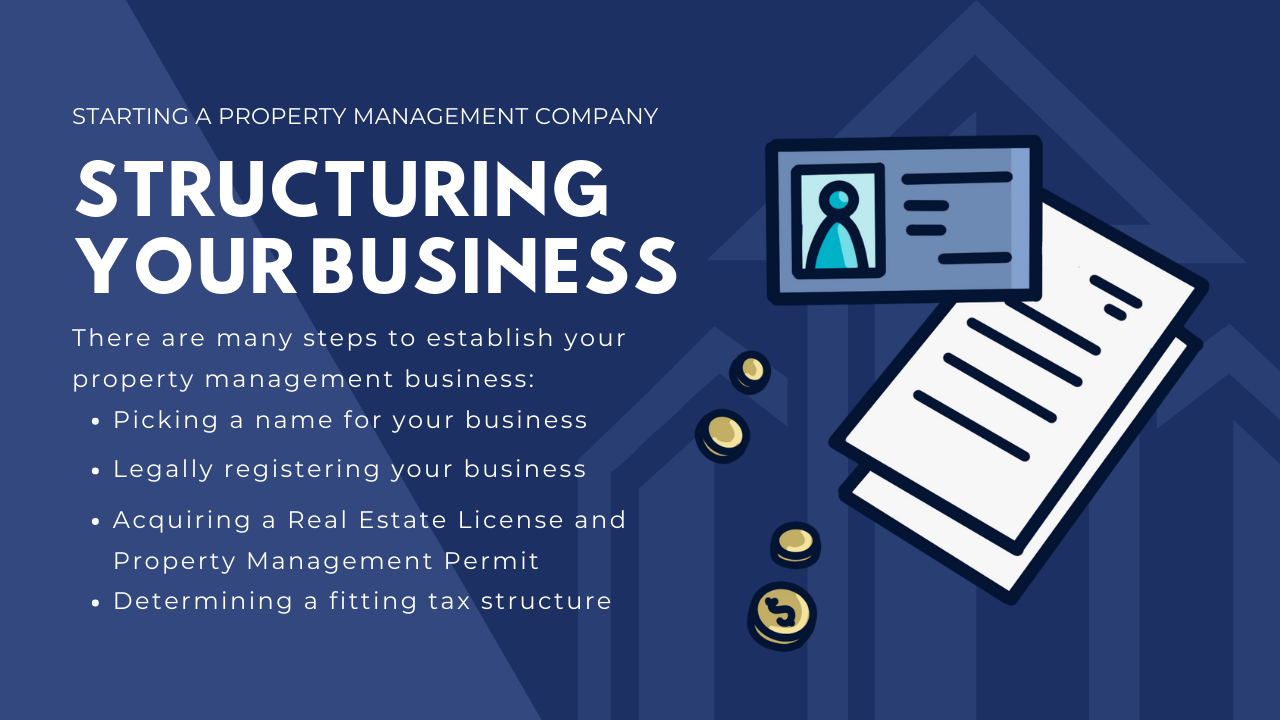
While many property management companies opt for limited liability companies (LLCs), consulting with a local attorney can help you determine the most ideal business structure for your specific situation. Obtaining your real estate license or even your real estate broker’s license should be a key consideration.
Fortunately, if you don’t want to consult an attorney, setting up an LLC in Illinois doesn’t have to be costly or complex.
You can easily navigate the legal filing process by accessing online resources provided by the state of Illinois and downloading their free Articles of Organization template.
With total costs typically ranging from $50 to $150, including fees, establishing your legal entity is fairly accessible for new business owners looking to own property management company. In addition, utilizing property management software can significantly streamline your operations from the start.
Don’t forget to decide on your property management company name beforehand, as it will be an integral part of establishing your business.
Once your company has been legally established and you have your necessary real estate license, consider setting up a dedicated office space, even if it’s just a room in your home, to manage your properties efficiently.
For privacy and professionalism, if you are working out of your home, it’s advisable for property managers to obtain a separate post office box for business correspondence.
Additionally, make sure that you have all of your professional communication channels in place, including a business email address, fax number, and phone number.
Utilize online services that offer automatic call forwarding if you require a separate phone number while still using your mobile phone. There are also plenty of handy property management automations and software that can streamline your business and save you time, giving you an edge over other property management companies.
After all, having a professional business email and phone number is essential for effective communication with tenants and clients while establishing your credibility as a new company, especially since starting a property management company involves navigating various regulations.
FREE Training: How to Launch Your Property Management Company
Step 2: Create a Strong Legal Contract & Have Knowledge of Illinois Property Management Laws
Once you’ve officially registered your company as a legal business entity and begun structuring its operations, the next crucial step is to draft a thorough, legally binding contract tailored for your clientele in Illinois. This is a vital aspect of all property management activities.
Starting this process early on is advisable, considering the time and financial investment it entails, especially with potential attorney fees. Remember, most property managers in Illinois need a real estate license, and for certain property management activities, a real estate broker’s license is mandatory.
Crafting a solid contract in collaboration with a specialized attorney in property management can safeguard both you and your company against liabilities, fraud, and any potential risks associated with clients. This is essential for property managers looking to build a sustainable business.
A comprehensive property management contract must adhere to all relevant Illinois laws and should clearly outline the following, keeping in mind the need for a real estate license or real estate broker’s license:
- Contract duration.
- Parties involved (your company and the property owner).
- Scope of responsibilities delegated to the property management company, including property maintenance, tenant acquisition, rent collection, repairs, emergency maintenance, and other monthly obligations.
- Exclusions from the property management company’s responsibilities.
- Detailed breakdown of fees payable by the property owner to the management company.
- Obligations of the property owner.
- Inclusion of a hold harmless clause, which legally absolves one or both parties from liabilities in case of injuries or damages incurred during the contract period.
- Termination clause, outlining conditions under which either party can terminate the contract with or without penalties, a key consideration for all property managers.
Don’t forget to explore how property management software can assist in managing these contracts and property management activities.
FREE Training: How to Launch Your Property Management Company
Step 3: Create a Business Plan and Scalable Structure for Your Illinois Real Estate Management Business
For property managers in Illinois who are aspiring to create a successful company, taking the time to craft a comprehensive business plan is essential. This plan should encompass your strategies for acquiring and manageing property effectively.
A well-developed business plan will serve as a roadmap, allowing you to fully lay out your business concept, strategies, and goals, while distinguishing your company from competitors in the market. It’s crucial for any property manager to understand the specific Illinois property management laws that will impact their business operations.
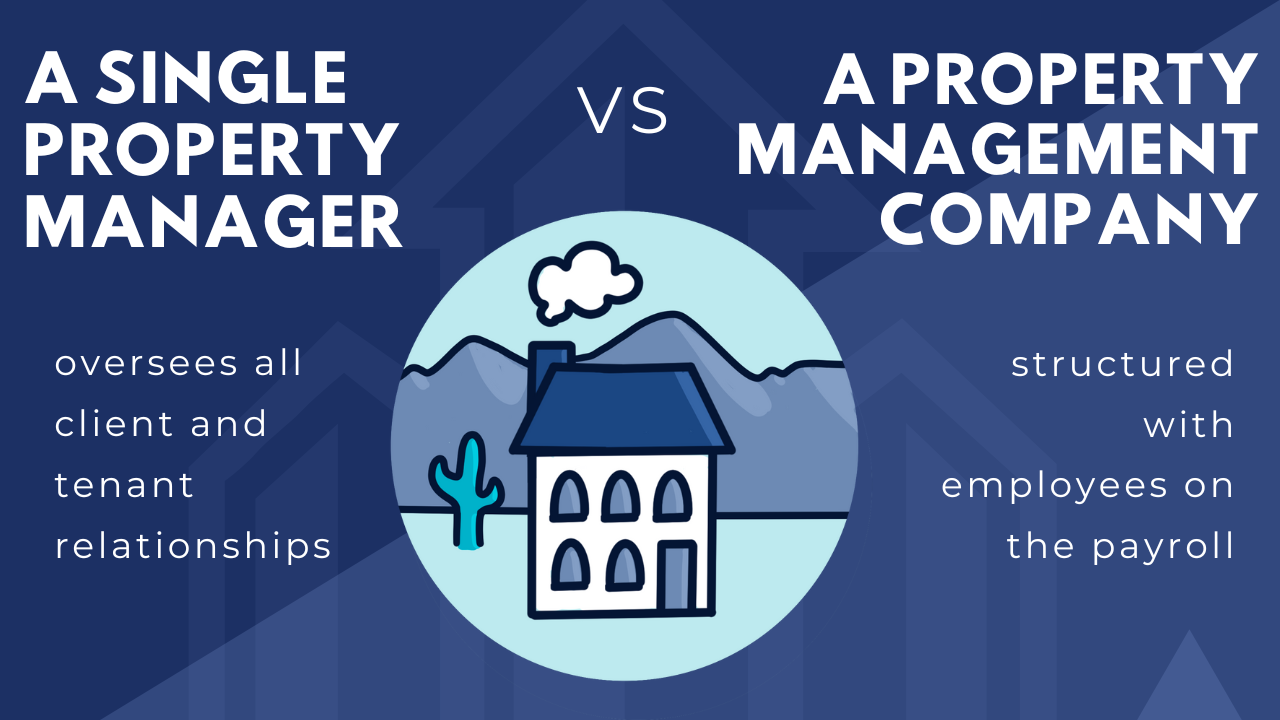
Aside from the big picture ideas of your company, you will also need to understand the analytical aspects of starting a business if you want it to really succeed in the long run. This includes how you will manage your license and ensure all property transactions comply with regulations.
When you are establishing your own property management company, it is essential to conduct thorough research on the physical location of your business and the surrounding property and communities in Illinois. This is a key industry practice.
This will provide you with valuable insights into your target demographic, rental rates in the neighborhoods you are looking to manage within, your competition for property owners, market trends, and the type of property management specialization that makes the most sense with the local demand, whether it be residential or commercial portfolio.

Here are some ideas that property managers can use to attract a large pool of leads in Illinois:
- Attend real estate business fairs, seminars, and expos to network with other industry professionals, keeping in mind the importance of a real estate license for many attendees.
- Invest in online paid advertising to increase exposure for your business.
- Develop a high-quality company website and optimize it for search engines to improve online visibility. This will help you gain visibility on search engines and rank your website higher than your competitors in search results, particularly for Illinois-specific searches.
- Advertise your property management services on rental websites and property/real estate magazines.
- Distribute brochures to real estate agents and property owners.
- Sponsor relevant TV programs to increase brand recognition in Illinois.
- Make use of popular social media platforms such as LinkedIn, Twitter, Facebook (including Facebook ads), Instagram, Google+, and Badoo to promote your company and expand your audience for your Illinois portfolio.
- Attend landlord and residence association meetings to network in person with property owners.
- Distribute business flyers in targeted areas to generate local interest in Illinois property.
- Display flex banners with company contact information and logos on any property that you have available for lease or sale. Ensure all necessary license information is visible.
By networking and implementing effective marketing strategies, you will have an easier time expanding your reach and growing your overall audience and brand identity as a licensed property manager in Illinois. You can expect to gain valuable resources this way.
FREE Training: How to Launch Your Property Management Company
Step 5: Find a Software to Fit Your Needs
Successful property management companies excel in optimizing client profitability by minimizing vacancy rates, securing tenants promptly, and operating their company in a way that mitigates risks such as property damages and legal expenses.
This requires a strong understanding of Illinois license requirements and accounting best practices for your portfolio.
Implementing incentive programs is a great strategy for succeeding in these goals.
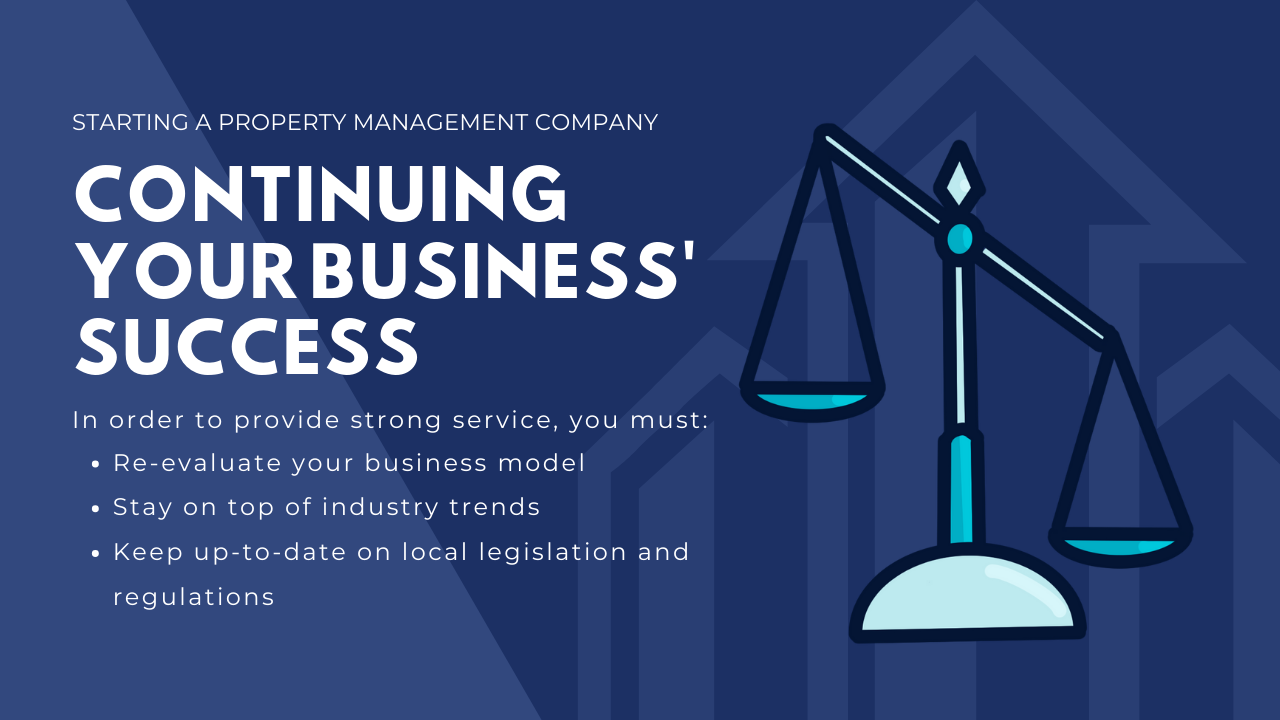
Research suggests that offering incentives to tenants can reduce your overall turnover rates and help to ensure tenant satisfaction. For property managers in Illinois, this can be a key differentiator.
As a property manager, you can introduce incentive programs, such as reward points for tenant contributions and exemplary behavior, to improve your tenant retention and promote positive relationships with renters.
One of the biggest jobs that a property manager has is maintaining the rental property and ensuring that it remains in good condition, especially for residential leases in Illinois.
Given the consistent need for repairs and maintenance in property management, building a network of reliable contractors is essential for seamless operations. These contractors should also own a proper license for work in Illinois.
We recommend that you establish these relationships early on in your property management career in Illinois. Cultivate strong partnerships with reputable contractors to ensure timely and high-quality services, as this will only improve your ability to effectively manage the property under your care and maintain your license.
FREE Training: How to Launch Your Property Management Company
The Bottom Line
If you do it right, starting your own property management company in Illinois can be incredibly lucrative and fulfilling.
To legally manage property for owners and tenants in Illinois, you’ll often need a real estate broker’s license or a real estate license, depending on the specific property management activities you perform, such as collecting rent payments or negotiating lease agreements.
Before you take a single property under your care, you must register your business properly and create a solid business plan so you can know what to expect as you continue your property management journey in Illinois. All necessary licenses must be secured.
Then, you will need to conduct thorough market research in order to identify your target demographic, set up your pricing structure (including how much clients will pay), and familiarize yourself with your competition in Illinois. This also includes understanding the various types of lease agreements prevalent in the Illinois market.
Finally, you will want to make sure that you are able to effectively manage your rental property by providing top notch services to both your clients and tenants, handling all aspects of their lease and ensuring timely rent payments.
Once you have launched your property management company, you will need to know how to properly advertise it. This will also require adherence to advertising regulations for licensed real estate professionals.
With all the other daily tasks and responsibilities that come along with managing rental property, solid marketing strategies can often fall to the backburner, which end up stunting the growth of your business. This is where you might need to pay for additional marketing resources to ensure your licensed business thrives.
If you want a helping hand when it comes to the marketing side of your company, contact our team of professionals at Upkeep Media. We specialize in helping property management companies thrive in Illinois by attracting more owners looking to lease their property.

